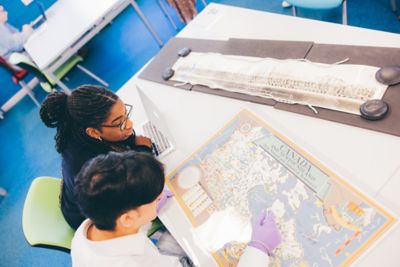*For full details including fees for part-time students and reduced fees during your time studying abroad or on placement (where applicable), see our fees page.
If you are a student from the EU, EEA or Switzerland, you may be asked to complete a fee status questionnaire and your answers will be assessed using guidance issued by the UK Council for International Student Affairs (UKCISA).
Additional costs
All students will need at least one device to approve security access requests via Multi-Factor Authentication (MFA). We also recommend students have a suitable laptop to work both on and off-campus. For more information, please check the equipment advice.
Essential course materials are supplied.
Books
You'll be able to access most of the books you’ll need through our libraries, though you may wish to buy your own copies of core texts. We recommend that you budget £100 per year for books, but this figure will vary according to which modules you take and which books you choose to buy. The Blackwell's bookshop on campus offers a year-round price match against any of the main retailers (for example, Amazon, Waterstones, WH Smith). They also offer second-hand books, as students from previous years sell their copies back to the bookshop.
Compulsory archaeological fieldwork
Many of our excavations incur some expenses, including flights to overseas destinations, and training fees. Where costs are incurred, you will need to pay in advance. You can claim back a proportion of your costs from the department on completion of your fieldwork. In the academic year 2021 to 22 students were entitled to claim back £30 of expenses per day of fieldwork; this amount is subject to change.
More information on fieldwork.
Volunteering and placements
For volunteering and placements, for example, work experience and teaching in schools, you will need to pay for transport and refreshments.
Optional field trips
Field trips allow you to engage with source materials on a personal level and to develop different perspectives. They are optional and costs to you vary according to the trip; some require you to arrange your own travel, refreshments and entry fees, while some are some are wholly subsidised.
For additional costs relating to geography please see the Geography BA course page.
Scholarships and bursaries
Faculty of Arts Alumni Scholarships
Our Alumni Scholarships provide support with essential living costs to eligible students. Find out more about eligibility and how to apply.
International students
We offer a range of international undergraduate scholarships for high-achieving international scholars who can put their Nottingham degree to great use in their careers.
Tuition fees 2026/27 (UK undergraduate students)
This is the UK undergraduate tuition fee for the academic year 25/26. It may increase for the academic year 26/27 and we will update our information once we have received confirmation of the fee from the UK Government.
For full details including fees for part-time students and reduced fees during your time studying abroad or on placement (where applicable), see our fees page.
If you are a student from the EU, EEA or Switzerland, you may be asked to complete a fee status questionnaire and your answers will be assessed using guidance issued by the UK Council for International Student Affairs (UKCISA).
Additional costs
All students will need at least one device to approve security access requests via Multi-Factor Authentication (MFA). We also recommend students have a suitable laptop to work both on and off-campus. For more information, please check the equipment advice.
Essential course materials are supplied.
Books
You'll be able to access most of the books you’ll need through our libraries, though you may wish to buy your own copies of core texts. We recommend that you budget £100 per year for books, but this figure will vary according to which modules you take and which books you choose to buy. The Blackwell's bookshop on campus offers a year-round price match against any of the main retailers (for example, Amazon, Waterstones, WH Smith). They also offer second-hand books, as students from previous years sell their copies back to the bookshop.
Compulsory archaeological fieldwork
Many of our excavations incur some expenses, including flights to overseas destinations, and training fees. Where costs are incurred, you will need to pay in advance. You can claim back a proportion of your costs from the department on completion of your fieldwork. In the academic year 2021 to 22 students were entitled to claim back £30 of expenses per day of fieldwork; this amount is subject to change.
More information on fieldwork.
Volunteering and placements
For volunteering and placements, for example, work experience and teaching in schools, you will need to pay for transport and refreshments.
Optional field trips
Field trips allow you to engage with source materials on a personal level and to develop different perspectives. They are optional and costs to you vary according to the trip; some require you to arrange your own travel, refreshments and entry fees, while some are some are wholly subsidised.
For additional costs relating to geography please see the Geography BA course page.
Scholarships and bursaries
Faculty of Arts Alumni Scholarships
Our Alumni Scholarships provide support with essential living costs to eligible students. Find out more about eligibility and how to apply.
Home students*
Over one third of our UK students receive our means-tested core bursary, worth up to £1,000 a year. Full details can be found on our financial support pages.
* A 'home' student is one who meets certain UK residence criteria. These are the same criteria as apply to eligibility for home funding from Student Finance.








